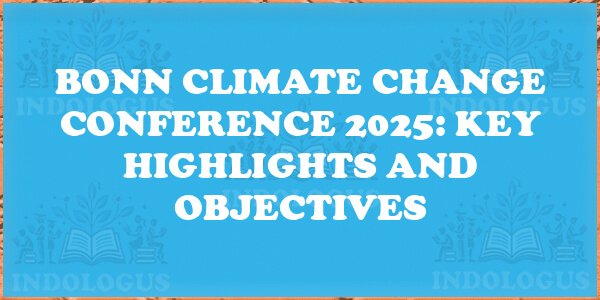The Bonn Climate Change Conference 2025 kicked off on June 16 in Bonn, Germany, with a gathering of over 5,000 government delegates, scientists, Indigenous leaders, and civil society actors. This event, held under the United Nations Framework Convention on Climate Change (UNFCCC), plays a vital role in shaping the global climate agenda.
What is the Bonn Climate Change Conference?
The Bonn Climate Change Conference is an annual technical meeting under the UNFCCC, a significant international treaty established in 1992 to combat climate change. Officially known as the Sessions of the Subsidiary Bodies (SBs), this event focuses on scientific, technical, and operational aspects crucial for climate governance.
Purpose and Objectives
- Advance scientific understanding through expert discussions.
- Assess progress in implementing climate agreements.
- Prepare actionable recommendations for the COP summit.
Key Players at the Conference
The conference is led by two permanent subsidiary bodies:
- Subsidiary Body for Implementation (SBI)
- Subsidiary Body for Scientific and Technological Advice (SBSTA)
These bodies engage with various stakeholders like government delegates, NGOs, climate scientists, and Indigenous leaders.
Agenda for Bonn Climate Change Conference 2025
This year’s conference focuses on:
- Global Goal on Adaptation (GGA)
- Climate finance for developing nations
- Loss and damage implementation mechanisms
- Technology transfer and innovation
- Monitoring progress on Nationally Determined Contributions (NDCs)
Significance of the Bonn Conference
The Bonn Climate Change Conference may not attract as much attention as COP summits, but it is a crucial hub for climate action. The decisions made here often influence negotiations and political choices at COP meetings, ensuring a science-based approach to global climate governance.
Key Takeaways for Competitive Exams
- The Bonn Climate Change Conference is an annual event under the UNFCCC to address climate change issues.
- It focuses on scientific, technical, and operational aspects related to climate governance.
- The conference sets the agenda and provides recommendations for the COP summit.
- Key players include the Subsidiary Body for Implementation (SBI) and the Subsidiary Body for Scientific and Technological Advice (SBSTA).
- This year’s agenda includes discussions on the Global Goal on Adaptation, climate finance, technology transfer, and more.
- The Bonn conference significantly influences decisions made at COP meetings, shaping global climate policies.



